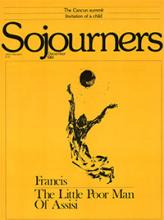My first encounter with Francis of Assisi occurred when I was just finishing my studies and embarking on a promising future. In Roman Catholic circles, when an engineer enters religious life, one expects him to join the Jesuits, well known for their efficiency, rather than the Franciscans. But from the beginning, I loved the saint who knew how to uncover the divine savor in the most banal things and events, as well as in the most downtrodden people. I was gripped by the way he took the gospel so seriously and could not wait to express the love he had found. He did not separate his profound respect for the transcendence of God from his profound understanding of the incarnation of God in the son, Jesus of Nazareth.
My faith grew in the context of postwar Europe where the theology of the incarnation was permeating all theological research. I knew that the incarnation for Francis did not remain a vague mystery. Francis' fraternal attitude toward all of creation and his attentive care for others were rooted in Jesus of Nazareth, who was at once fully human and truly God. Thus he saw all beings as part of a world centered on the flesh-and-blood Christ.
But like many of my brothers, I continued to believe that one acquired a more profound understanding of the mystery of Christ by living a "spiritual life" and by attaining a certain "quality of love." I knew well that Francis, from the beginning in the rule of the Friars Minor, insisted on an evangelical (in its true meaning of gospel-based) lifestyle, a whole-life context and not a purely interiorized spirituality. Still, the pervading views at the time prevented me from walking where Francis had lit the way--on a road which seemed to me to be God's way for those called to the Franciscan life: to live with our whole self--body and soul--the mystery of the incarnation.
Read the Full Article

